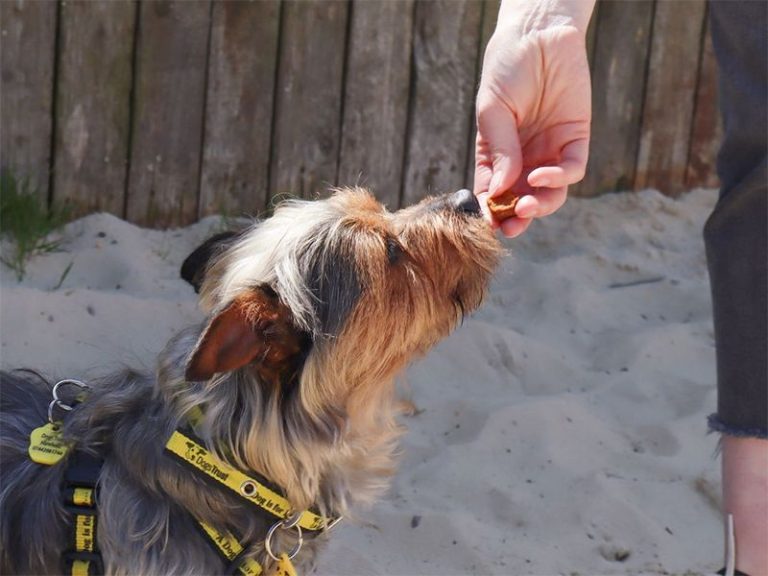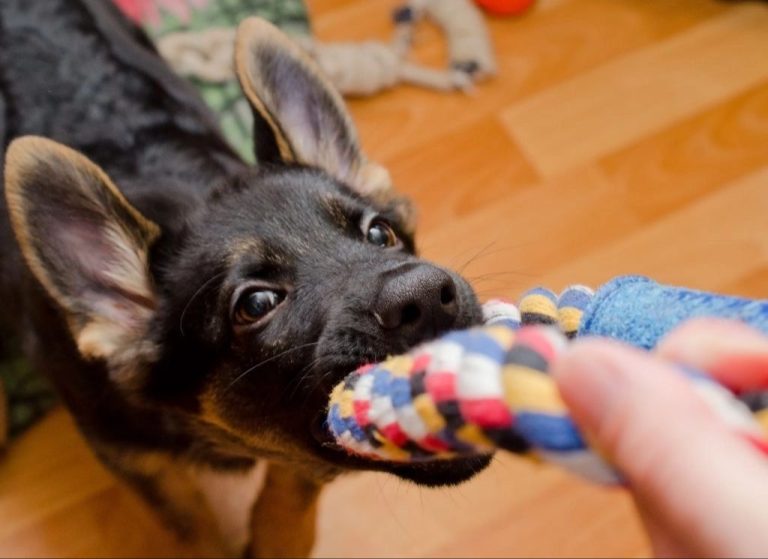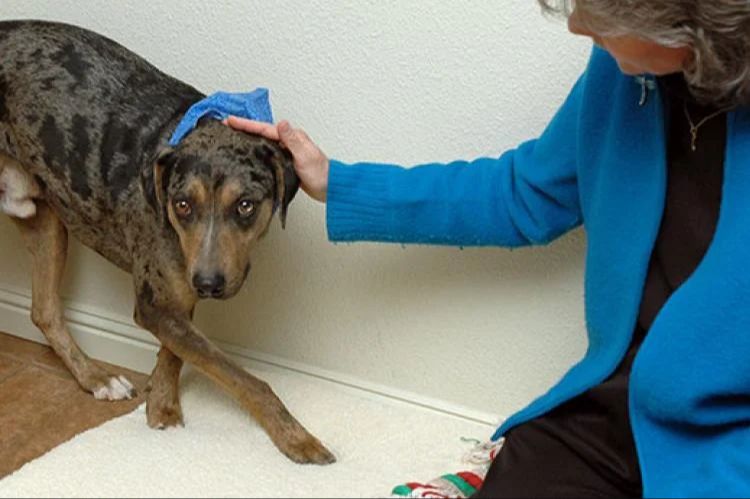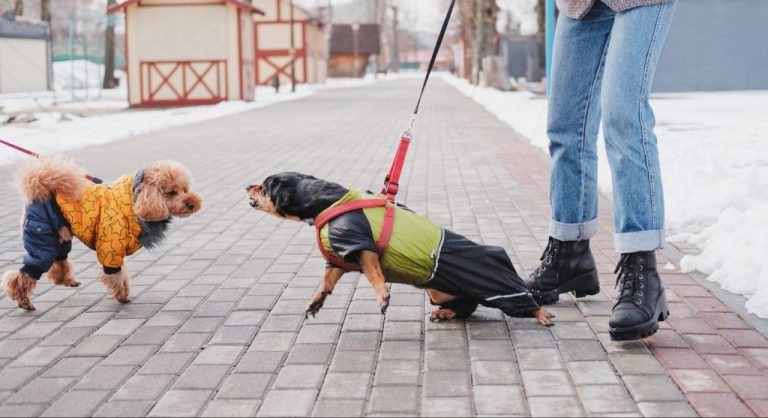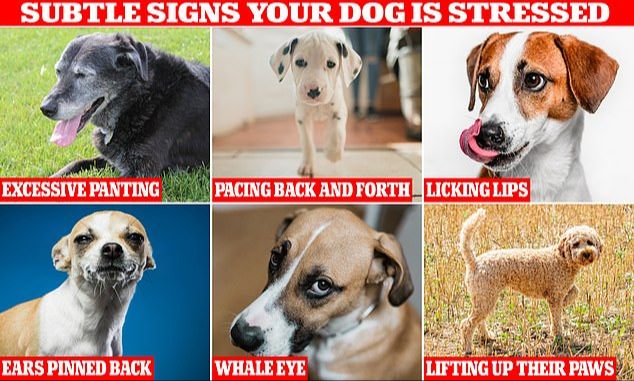Helping Your Dog Overcome Fear Of Loud Noises: Thunder And Fireworks
Fear of loud noises like thunder and fireworks is a common anxiety issue for dogs. Studies estimate that around 50% of dogs experience at least some fear of thunder and other loud noises [1]. While some dog breeds, like Labrador Retrievers and Golden Retrievers, tend to be less affected, any dog can develop anxieties related to loud noises regardless of breed. When a loud noise occurs, especially something abrupt like thunder or fireworks, dogs may exhibit signs of fear like shaking, hiding, and attempting to escape. This fear response is distressing both for dogs and their owners.
This article provides an overview of why dogs are afraid of thunder and other loud noises and how pet owners can help their dogs overcome these fears. It covers recognizing the signs of noise anxiety in dogs, steps for preparing for events with loud noises like thunderstorms and fireworks displays, training techniques to build confidence, medications that may help, natural remedies to try, and when to seek additional help from an animal behavior specialist. The goal is to provide dog owners with actionable techniques to reduce their dog’s fear and anxiety during loud noises.
Why Dogs Are Afraid
Dogs tend to have sensitive hearing, so loud noises like thunder and fireworks can be uncomfortable or even painful for them (Ask Metafilter, 2015). The noise reminds them of negative experiences associated with storms, like getting stuck outside in the rain or being alone during a storm, which causes fear and anxiety. Dogs may also have an evolutionary predisposition to be alert to sudden loud noises as possible threats, since their wild ancestors needed to be aware of danger in their environment to survive (Assisian Animal Health). This instinctive wariness of loud noises persists in domesticated dogs today.
Signs of Fear
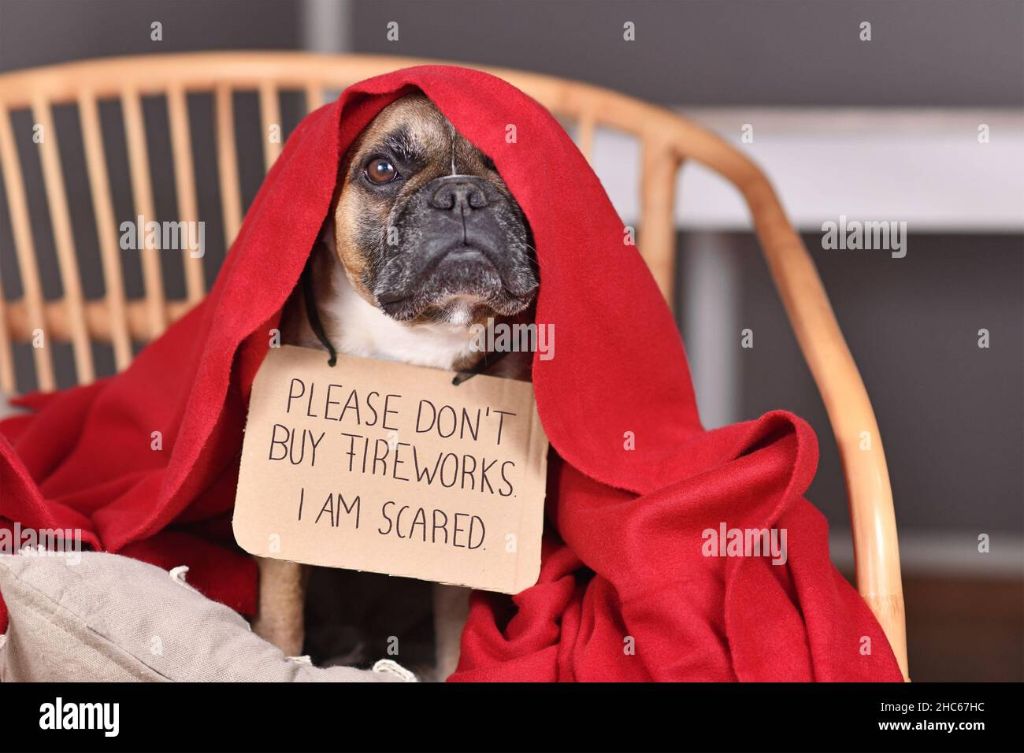
Dogs exhibit both physical and behavioral signs of fear in response to loud noises like thunder and fireworks.1 Common physical signs include:
- Shaking
- Panting
- Hiding
- Restlessness
Behavioral signs may include:
- Destructive chewing or digging
- Attempting to escape or run away
These behaviors stem from a fear response triggered by the loud noises. The shaking, panting, and hiding are instinctual reactions reflecting the dog’s anxious emotional state. Chewing, digging, and running away are the dog’s attempts to cope with or avoid the scary stimulus.
Preparing for Loud Noises
One of the best ways to help a dog overcome a fear of loud noises is through desensitization techniques using recordings. Start by playing recordings of thunder or fireworks at a very low volume while rewarding the dog with treats for calm behavior. Slowly increase the volume over multiple sessions until the dog can remain relaxed at a normal noise level. This gradual exposure teaches the dog these noises are not dangerous. According to the article “How to Reduce the Fear of Sound In Your Dog” on Rover.com, “Sound desensitization is a simple way of teaching your dogs how to be calm during loud noises” (source).
Creating a safe space or “den” where the dog can voluntarily retreat during noisy events can also be helpful. Outfit the space with blankets, favorite toys, and anything else that comforts the dog. Diffusing calming pheromones like Adaptil or using products like the ThunderShirt can promote relaxation in the safe space as well.
During the Noise Event
When fireworks or thunderstorms are actively occurring, remaining calm and providing distraction is key to helping your dog overcome their fear. According to the AKC, you should avoid overly comforting your dog or reinforcing the fearful behavior when loud noises occur, as this can inadvertently communicate to your dog that they should be afraid. Instead, try to go about your normal routine and keep your own behavior relaxed and confident.
Providing fun distractions for your dog is a great way to shift their focus during loud noises. The AKC recommends games, food puzzles, or playtime to keep your dog’s mind engaged. New toys may capture their attention better than old favorites. You can also use music or white noise, like from the radio or a sound machine, to help mask frightening sounds and make your dog feel more secure.
It’s understandable to want to comfort your dog when they’re afraid, but remain calm for their sake. Keep distracting and reassuring them until the noises have passed. With time and positive associations, your dog can overcome their fear of loud noises.
Anxiety Medications
Some dogs may require anti-anxiety medication or sedatives to help them remain calm during loud noises like thunderstorms and fireworks. It’s important to consult with your veterinarian before giving your dog any medications, as they can advise on proper dosing and potential side effects (Medicating for Storm and Fireworks Phobia). Common anti-anxiety medications prescribed by vets include:
- Alprazolam – A fast-acting benzodiazepine that provides a sedative effect (Medications for Dogs Afraid of Fireworks and Noises).
- Clonidine – Helps relieve anxiety by altering nerve signals in the brain (Noise and Storm Phobias and Anxiety in Dogs).
- Trazodone – An antidepressant sometimes prescribed for short-term anxiety relief.
These medications are usually given 30-60 minutes prior to an anticipated noise event. It’s important to closely monitor your dog for potential side effects like sedation or disorientation. Never give your dog anxiety medications without your vet’s guidance.
Training Techniques
One of the most effective ways to help a dog overcome a fear of loud noises is through training techniques like counterconditioning, obedience training, distraction, and redirection. Counterconditioning involves associating the fear-inducing stimulus, like thunder or fireworks, with something positive. For example, when you hear a loud noise approaching, immediately give your dog a tasty treat. This teaches your dog to associate thunder with good things happening. Continue providing treats and positive attention throughout the noise event.
Obedience training can also build confidence in your dog. Teaching commands like “sit,” “stay,” and “focus” gives your dog a job to do amid chaos. Distracting your dog with play, food puzzles, or training during storms or fireworks can redirect their attention away from the frightening sounds. However, be sure to reward calm behavior – don’t inadvertently reinforce anxious behaviors by providing comfort when your dog is pacing, panting, whining, etc.
These training methods take consistency and patience, but can help retrain your dog’s response to loud noises over time. Always use rewards-based techniques – punishment will only increase a dog’s fear and anxiety.
Homeopathy and Natural Remedies
There are some natural and homeopathic options that may help ease a dog’s anxiety during loud noises. Some options to consider include:
Herbs: Certain herbs like chamomile, valerian root, and passionflower have calming properties and can help relieve anxiety in dogs. Herbal supplements or teas can be given, but always check with your vet first for dosage recommendations based on your dog’s size and health condition.
Pheromones: Synthetic dog appeasing pheromones (like Adaptil) mimic natural calming pheromones and may help reduce anxiety when diffused at home or worn in a collar. Some evidence suggests they work, but efficacy can vary between individual dogs.1
Homeopathic remedies: Some options like Aconitum or Argentum Nitricum claim to reduce anxiety, but there is limited scientific evidence supporting homeopathy for dog anxiety relief. Consult a veterinary homeopath to see if remedies could help your individual dog.
Overall the evidence is still limited on natural options for dog anxiety, so be cautious and talk to your vet. But some remedies are generally safe and may be helpful alongside other techniques.
When to Seek Professional Help
If your dog’s fear of loud noises is severe and persists over time without improvement, it’s best to seek guidance from a veterinarian or animal behaviorist. Signs that professional help is needed include:
- Hiding and shaking for hours or days after a loud noise event
- Loss of appetite, vomiting, or diarrhea during times of loud noises
- Self-harming behaviors like chewing paws or tail
- Aggression when startled by noises
- Urinating or defecating involuntarily from fear
A vet can rule out medical conditions and may prescribe anti-anxiety medication or natural supplements to take the edge off your dog’s fear. They can also refer you to a certified animal behaviorist. Together you can develop a customized desensitization and counterconditioning training plan to gradually get your dog comfortable with loud noises.
With professional guidance, medication if needed, and dedicated training, it’s possible to help dogs overcome debilitating noise phobias. Don’t wait to get help if your dog’s quality of life is drastically impacted.
Conclusion
Loud noises like thunder and fireworks are terrifying for many dogs. However, with patience and compassion, you can help your best friend overcome their fear and anxiety. Always remember that fearful behavior in response to loud noises should never be punished. Yelling at or forcing your dog to confront their phobia will only make the problem worse.
With appropriately prescribed anxiety medications, a customized training and desensitization plan, and in some cases supplements or natural remedies, most dogs can learn to tolerate loud noises. But progress will take time. Stay committed and don’t give up. With the consistent and positive reinforcement strategies outlined in this article, your dog can overcome their phobia and remain calm even during the scariest storms and loudest fireworks shows.
The most important message for any pet owner to remember is this: be patient and keep trying. Overcoming a lifelong phobia is difficult. Your dog may suffer relapses along the way. But if you stick to a thoughtful training plan that builds confidence through baby steps, reward bravery, and never punish fear, your beloved companion can learn to face their fears.

